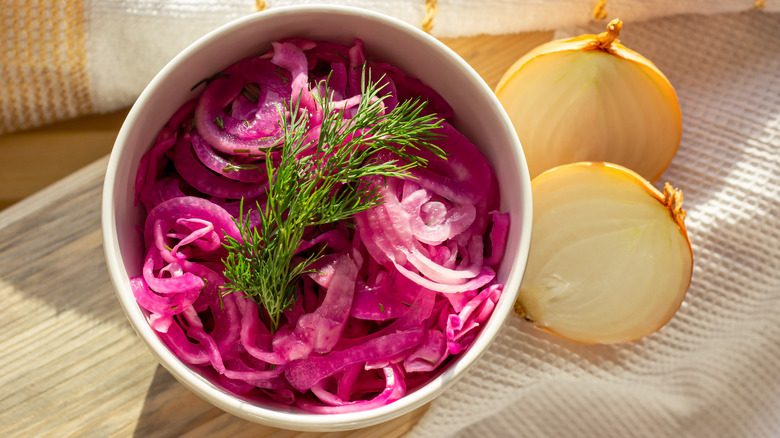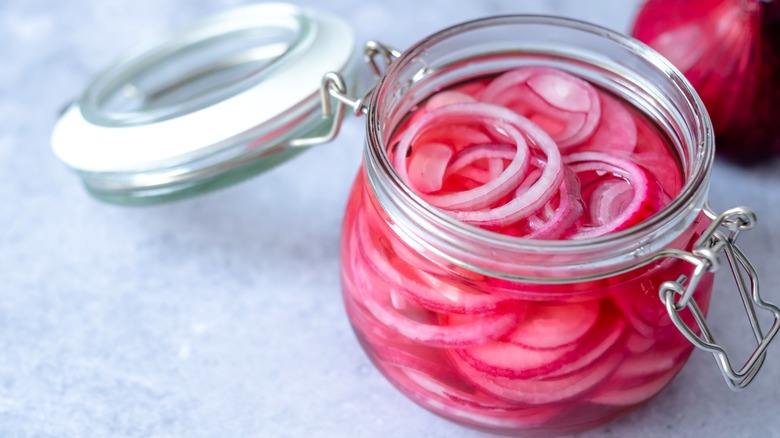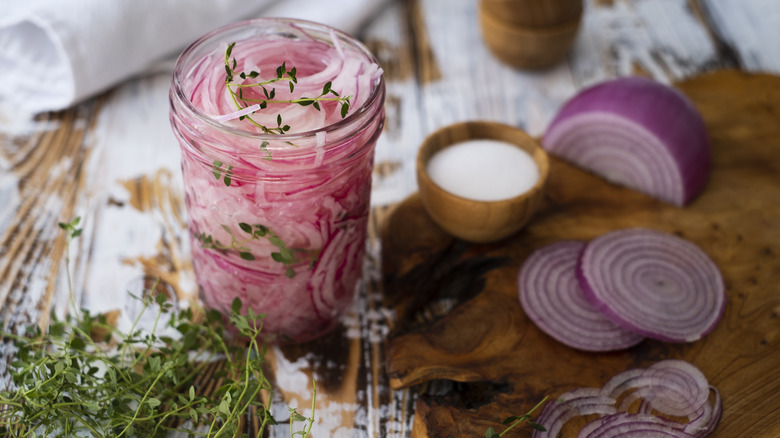The Pickled Onion Storage Mistake That's So Easy To Avoid
Whether adding them to a hearty burger for a touch of tang or a well-designed charcuterie board for a pop of pink, pickled onions, red or otherwise, are a fresh and zippy provision that fits in seamlessly to a variety of dishes. Although you can purchase them at the supermarket, pickled onions are easy to make at home. A simple combination of vinegar, salt, water, and the herbs, spices, and seasonings of your selection is all it takes to pickle onions. Though the process itself is simple, you should avoid making one common storage mistake to preserve and maximize the freshness and taste of your pickled onions. Long story short, always store pickled onions in a glass container.
Storing pickles in glass containers is advantageous for two reasons. First, glass is non-reactive, which means it doesn't interact with the acidic vinegar that's central to pickling solutions. This ensures that the flavor profile of the pickles remains unaltered, eliminating the risk of metallic or off-putting flavors that might arise from reactions with metal containers made of copper or aluminum. Secondly, glass containers preserve the original taste of pickled onions by preventing the absorption of external odors or flavors, a common concern with plastic containers. By storing pickled onions properly, you're safeguarding their flavor and freshness for long-term enjoyment. If you've purchased pickled onions in a plastic container, it's likely made from food-grade materials. However, you can always transfer them to a sealable glass container for extra peace of mind.
Additional tips for pickled onion storage
So you've pickled your onions in a glass jar — great work! However, there are a few more tips to keep in mind to get the most out of these zesty little bites. Pickled onions should be stored in a sealed container to avoid exposure to air, which hastens spoilage and increases the amount of time the onions can be exposed to potential bacteria and pathogens. Similarly, they should always be stored in a refrigerator that's set to at least 40 degrees Fahrenheit. You should also remain mindful of where you place the pickled onions in the fridge. Keep them away from raw meat, seafood, and other foods that could potentially facilitate cross-contamination if your lid is loose.
Although it's not necessary for food safety, one handy tip can help maintain the vibrant color of pickled red onions specifically. Letting them rest overnight in the pickle brine rather than breaking into them after 10 minutes (which is all you really need to quick pickle produce) can bolster their bright red hue. You might also consider pickling red onions with beets, chili flakes, or other red or pink ingredients to keep those colors as fresh as the onion tastes. Between the glass jar, food safety practices, and a simple clue on maintaining color, you'll have the freshest pickled onions in town.
Recognizing signs of spoilage
Even with proper storage, pickled onions don't last forever. Although an acidic brine is great for slowing the growth of bacteria and extending the shelf life of pickled onions, it's important to recognize the signs of spoilage. For starters, know how long pickled onions last. Homemade pickled onions last up to four weeks, while store-bought pickles can last up to three months. It's around those time frames you should inspect for signs of degradation.
If you notice mold, that's an obvious sign that it's time to throw out pickled onions. If mold makes its way onto the container itself, remove it immediately without making direct skin contact before soaking it in a bleach-water solution for at least 30 minutes. Extreme discoloration or cloudiness is another cue that pickled onions have taken a turn for the worse. Pickled onions should be firm and crunchy, so if you notice a slimy, snotty texture, replace them. Thanks to the combination of vinegar and onion, pickled onions have a naturally funky smell, but should never have a rancid, foul, or sour aroma. Whether it's pickled pearl onions for cocktails or peppery pickled yellow onions for sandwiches, proper storage practices are critical for maintaining the integrity of this tangy snack.


